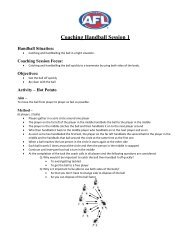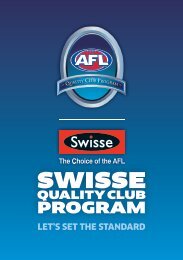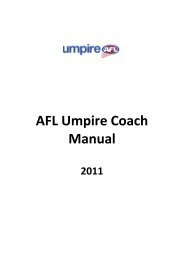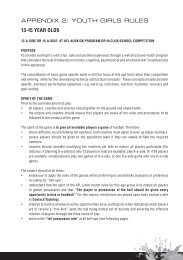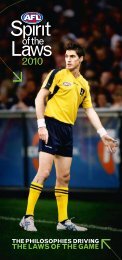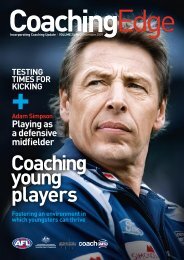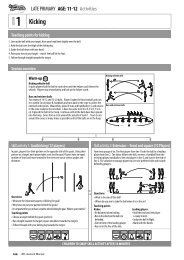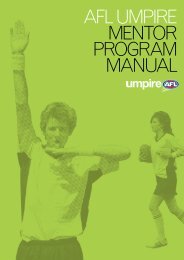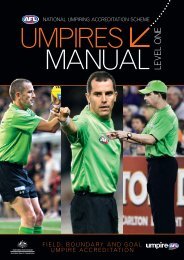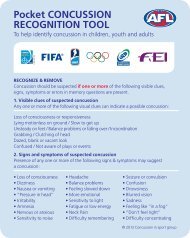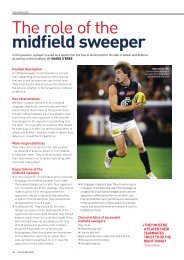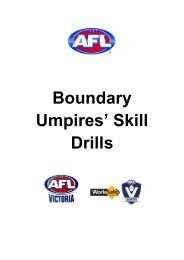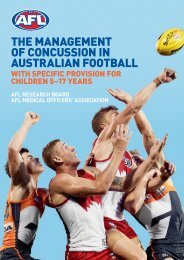2012 Youth Coaching Manual - AFL Community
2012 Youth Coaching Manual - AFL Community
2012 Youth Coaching Manual - AFL Community
You also want an ePaper? Increase the reach of your titles
YUMPU automatically turns print PDFs into web optimized ePapers that Google loves.
Goal-setting is an important part of the planning process. Goals should follow the SMART principle. They should be:<br />
s<br />
m<br />
a<br />
r<br />
t<br />
Specific<br />
Set goals specific to your players’/team’s needs. Identify weak areas in your game and develop appropriate strategies that<br />
address these weaknesses. Specific, challenging goals are most effective in improving performance via behavioural change.<br />
Measurable<br />
Goals need to be expressed in measurable terms. Quantify everything wherever possible by identifying target times, etc., e.g.<br />
• Each player will get equal time in games over the season.<br />
• The team will finish higher in the league than last year.<br />
• Players will better their score on a skill circuit.<br />
• Players will better their times by 10 per cent.<br />
Achievable<br />
Goals need to appropriately reflect your player’s and team’s potential. While some goals should be challenging, it is<br />
important initially to establish goals that can be achieved before progressing to more difficult goals. Coaches should also<br />
discuss the goals within the group to convince their players they can reach the standard set.<br />
Realistic<br />
Coaches need to set goals that are difficult enough to challenge but realistic enough to be achieved. A way to ensure the<br />
goals are realistic is to use past experiences as a guide, thus indicating what you are likely to achieve in the future.<br />
Time bound<br />
Identify target dates for accomplishing your player’s/team’s goals. Setting dates helps motivate coaches and players and is a<br />
continual reminder of the urgency of achieving such goals in a specified, realistic time frame.<br />
Other essential goal-setting tips<br />
• Set positive goals on a daily, weekly, monthly and yearly basis.<br />
• Set goals for both training and games.<br />
• Develop strategies for each goal.<br />
• Write goals down and keep them where they can be reviewed regularly.<br />
• Provide for goal evaluation. Recording your goals and evaluating your feedback is essential if goals are going to be<br />
effective in enhancing individual and team performance.<br />
• Be flexible in the approach. Unforseen circumstances may cause you as coach to re-evaluate your team goals and develop<br />
alternative strategies.<br />
• Ensure ownership over goals. Goals become motivating when the whole team has direct input into them and feel<br />
accountable to achieving the goals.<br />
Long-term goals<br />
To provide a blueprint for a season, long-term goals should be set from the beginning. The first step is to map out the training<br />
and competition schedule for the time period under consideration. Then the coach and players should decide on what they<br />
would like to have achieved by certain dates. The majority of long-term goals should be process-orientated and focus on<br />
development of physical and psychological abilities through means controllable by the player.<br />
Goals are set not as an end in themselves, but as a guide to and measure of achievement. Monitoring and adjusting goals<br />
is an essential part of that process. It is rare that a goal is exactly achieved and people either fall short or exceed a goal. The<br />
coach should help players understand that each evaluation of goal progress is simply a way of determining whether to adjust<br />
the standard to a more reasonable level or raise it to a new, more challenging one. Long-term goals should be reviewed on a<br />
regular basis.<br />
<strong>AFL</strong> <strong>Youth</strong> <strong>Coaching</strong> <strong>Manual</strong><br />
65



